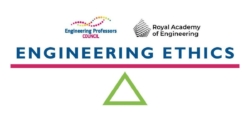 Case enhancement: Industrial pollution from an ageing pipeline
Case enhancement: Industrial pollution from an ageing pipeline
Activity: Prompts to facilitate discussion activities.
Author: Sarah Jayne Hitt, Ph.D. SFHEA (NMITE, Edinburgh Napier University).
Overview:
There are several points in this case during which an educator can facilitate a class discussion about relevant issues. Below are prompts for discussion questions and activities that can be used. These correspond with the stopping points outlined in the case. Each prompt could take up as little or as much time as the educator wishes, depending on where they want the focus of the discussion to be.
Case Summary – Discussion prompts:
1. Professional Contexts. The question listed in the case study is meant to elicit students’ consideration of working as an engineer in a professional culture different from the one they are familiar with. To answer this question, educators could have students reflect quietly and make notes for a few minutes, or discuss with a partner before sharing with the class. If students are hesitant to engage in questions of cultural differences, they could be prompted to examine why they have that discomfort. Educators might also want to prepare for conversations like this by reviewing the guidance article Tackling tough topics in discussion.
2. Meeting Preparation. The question listed in the case study focuses on the choices that engineers make when presenting data; that is, should they show managers a complete or incomplete picture of the situation in question? What implications does that have in terms of managers’ ability to make decisions? The question also is meant to help students consider aspects of professional communication. Students could be tasked with actually doing a version of the meeting preparation as pairs in the classroom, or they could do this as a reflective exercise as well.
Dilemma – Part one – Discussion prompts:
1. Personal and Professional Responsibility. Here, students are being asked to explore their own personal responses to the informal housing situation outside the factory and interrogate whether or not that response could or should affect their professional actions. The question also investigates the scope of professional responsibility, and at what point an engineer has fulfilled this or fallen short. To engage students in this discussion, educators could split the class in half, with half the room discussing the position that Yasin does NOT have a responsibility, and why; and the other half discussing the position that Yasin DOES have a responsibility and why. Alternatively, students could be asked to write down their own answer to this question along with reasoning why or why not, and then the educator could ask volunteers to share responses in order to open up the discussion.
2. Economic Contexts. Students can use this question to expand on question 1 of this section, and in fact they may already have drawn cost into their reasoning. One way to open up this discussion is to think of the broader costs, meaning: is there a social or environmental cost that the company externalises through its polluting activities? Another way into the question is to go back to the question of responsibility, because engineers are routinely responsible for making budgets and judgements related to costs. Through this financial activity, are they able to advocate for more ethical practices, and should they?
Dilemma – Part two – Discussion prompts
1. Job Offer. This question is meant to point to the issue of bribery, and have students wrestle with the situations presented in the case. Educators could have students review various definitions of bribery, including the one in the RAEng’s Statement of Ethical Principles. They could compare this with the Engineering Council of India’s Code of Ethics. What do these two codes say about Yasin’s case? If they don’t give clear guidance, what should Yasin do? Students could discuss why or why not they think this is bribery in small or large groups, and could debate what Yasin’s action should be and why.
2. External Reporting. This question addresses whistleblowing, and what responsibilities engineers have for reporting unethical actions to professional or legal entities. Students could be asked individually to answer the question and give reasons why, based on the codes of ethics relevant to the case. They could also answer the question based on their own personal values. Then they could discuss their responses in small groups and interrogate whether or not the codes conflict with their values. Educators could at this point raise the question of whether or not there may be different cultural expectations in this area that Yasin might have to navigate, and if so, if this should make any difference to the action he should take. Students could also be asked to chart out the personal and professional repercussions Yasin could experience for either action. This discussion could be good preparation for activity #5, the debate.
This work is licensed under a Creative Commons Attribution-ShareAlike 4.0 International License.
Any views, thoughts, and opinions expressed herein are solely that of the author(s) and do not necessarily reflect the views, opinions, policies, or position of the Engineering Professors’ Council or the Toolkit sponsors and supporters.




